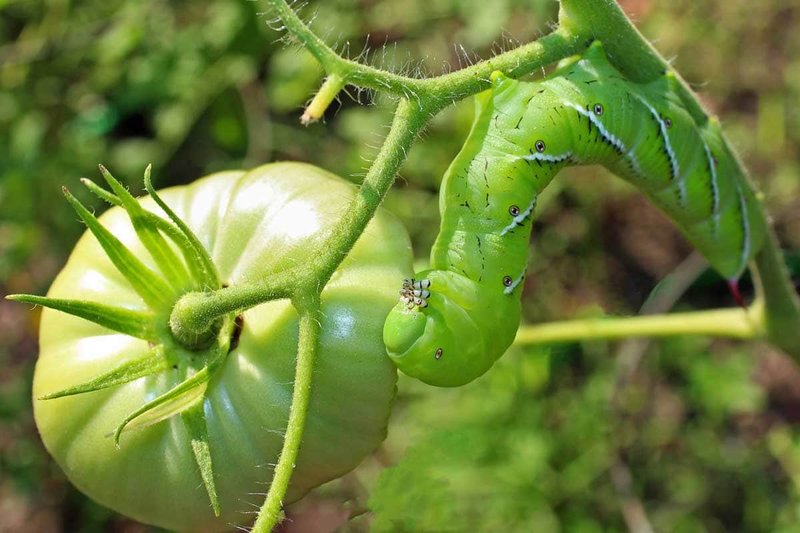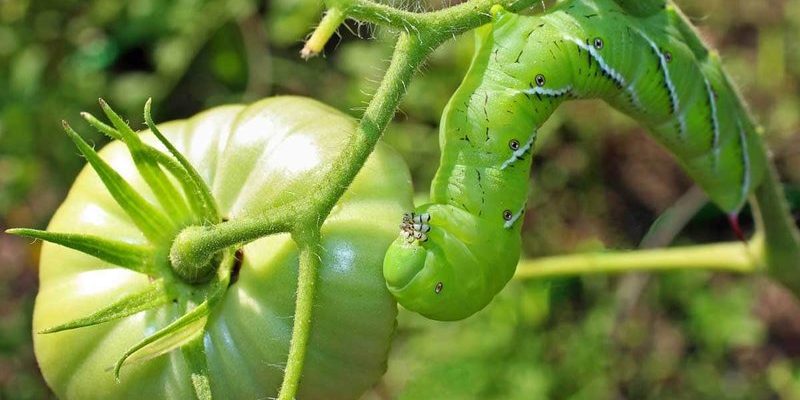
So, why should we care about hornworms and their impact on our favorite crops? Well, these little munchers don’t just put a damper on our gardening dreams; they can wreak serious havoc on the overall health and yield of your plants. Let’s dig deeper and explore how hornworms affect tomatoes, peppers, and eggplants, and what you can do to protect your precious plants from these pesky invaders.
What Are Hornworms?
Hornworms are the larval stage of certain moths, primarily the **tobacco hornworm** (Manduca sexta) and the **tomato hornworm** (Manduca quinquemaculata). These green, plump caterpillars are often mistaken for plant stems—they blend in remarkably well! They typically measure about 3 to 4 inches long and have a distinctive horn-like structure on their back, which gives them their name.
The life cycle of a hornworm starts with a female moth laying her eggs on the underside of leaves. Once the eggs hatch, the tiny caterpillars emerge and start feasting on the plant. Here’s the kicker: they can consume a significant amount of foliage in just a few days! This rapid feeding can lead to stunted growth, reduced fruit yield, or even death of the plant.
Knowing the enemy is half the battle. Having a visual reminder of these pests can help you catch them before extensive damage occurs.
How Hornworms Damage Tomato Plants
Tomatoes are a favorite target for hornworms. When they latch onto a tomato plant, they can cause several types of damage. First, they chew through the leaves, which reduces the plant’s ability to perform photosynthesis—a crucial process for growth and fruit production. Imagine trying to run a marathon with one leg tied behind your back; that’s what your tomato plants experience without their leaves.
Additionally, hornworms can munch on the fruit itself, leading to unsightly holes and making them unappetizing. This is especially concerning for gardeners hoping to harvest a bountiful crop for delicious summer salads or sauces. If you see bare stems and half-eaten tomatoes, you might have a hornworm infestation on your hands.
To combat this, it’s essential to check your plants regularly. You might find these pests hidden during the day, so it’s wise to inspect the undersides of the leaves, too.
The Impact of Hornworms on Pepper Plants
Just like tomatoes, **pepper plants** are not safe from hornworm attacks. When hornworms feed on pepper leaves, the plants can experience reduced vigor and yield. One alarming effect is that the removal of leaves can lead to **sunscald** on the fruit. This happens when unprotected sections of peppers get scorched by the sun, resulting in unsightly blemishes and potentially affecting the taste.
Moreover, hornworms can also target the peppers themselves. They’ll chew holes into the fleshy fruits, rendering them not only damaged but also more susceptible to disease. Think of it this way: if you were hosting guests for dinner and served them spoiled food, you’d be in for a disaster! Healthy, intact peppers are essential for any garden.
To fight back, consider companion planting. Some plants, like basil, can repel hornworms and other pests, giving your peppers a fighting chance.
Eggplants and Their Struggles with Hornworms
Now let’s talk about **eggplants**. These purple beauties aren’t immune to hornworms either. Much like tomatoes and peppers, hornworms can strip eggplant plants of their leaves and even attack the fruit. If you’re growing eggplants, keep an eye out for wilting leaves and damaged fruit.
The damage hornworms cause can lead to a decline in eggplant quality. The fruits may end up smaller and less flavorful, which is a disappointment for anyone who loves eggplant parmesan or baba ganoush. Plus, when these pests feast on the leaves, the plant may fail to produce flowers, meaning fewer fruits overall.
Regularly monitoring your garden is crucial here, too. Look out for signs of hornworm activity, like droppings (which look like small dark pellets) and the presence of other pests, as hornworms can attract unwelcome guests.
Signs of Hornworm Infestation
Detecting hornworms in your garden is critical for keeping your crops healthy. Here are some signs to look out for:
- Chewed Leaves: This is often the first sign you’ll see. If your plants look like they’ve been through a blender, check for hornworms.
- Holes in Fruit: Look for any punctures or holes in your tomatoes, peppers, or eggplants.
- Droppings: Not the most pleasant sight, but hornworm droppings can help you spot them. If you see small pellets on the ground, there’s a good chance of a hornworm nearby.
- Visual Inspection: Since they blend in so well, it’s crucial to do a thorough check of the undersides of leaves and the stems.
If you spot any of these signs, it’s definitely time to take action.
How to Control and Prevent Hornworms
Managing hornworms can seem daunting, but with the right strategies, you can protect your crops effectively. Here are some steps you can take:
1. **Handpicking:** One of the most straightforward methods is to go out into your garden and pick them off by hand. Just make sure to wear gloves, and don’t be shy about giving them a good squish to avoid a second round of munching.
2. **Natural Predators:** Encouraging birds and beneficial insects can help keep hornworm numbers in check. Consider planting flowers that attract ladybugs and lacewings, which are hornworm predators.
3. **Neem Oil:** Using organic neem oil is another effective method. This natural pesticide disrupts the hornworms’ growth and feeding. Mix it with water and spray it on infested plants, following the instructions on the label.
4. **Crop Rotation:** Changing the location of your plants each season can help reduce hornworm populations. They love to return to their favorite plants, so a little rotation can throw them off.
By applying these techniques consistently, you’ll increase your chances of a bountiful harvest, free from hornworm havoc.
The Bigger Picture: Why This Matters
Understanding how hornworms affect tomato, pepper, and eggplant crops is crucial for any gardener. Keeping them at bay not only ensures a better yield but also contributes to the overall health of your garden ecosystem. When plants are healthy, they’re more likely to withstand other pests and diseases, leading to a thriving, vibrant garden.
If you’re passionate about growing your own food, protecting those plants from hornworms should be a top priority. It’s all about working with nature to maintain a balanced environment. Whether you’re nurturing a small balcony garden or a full-fledged vegetable patch, being proactive against hornworms will pay off in delicious home-grown produce.
In the end, gardening is an adventure. You’ll encounter challenges, learn from them, and find joy in every ripe tomato, pepper, or eggplant you harvest. Just remember, you’re not alone in this. Many gardeners face the same struggles, and with a bit of knowledge and care, you can outsmart those pesky hornworms and enjoy the fruits of your labor!

